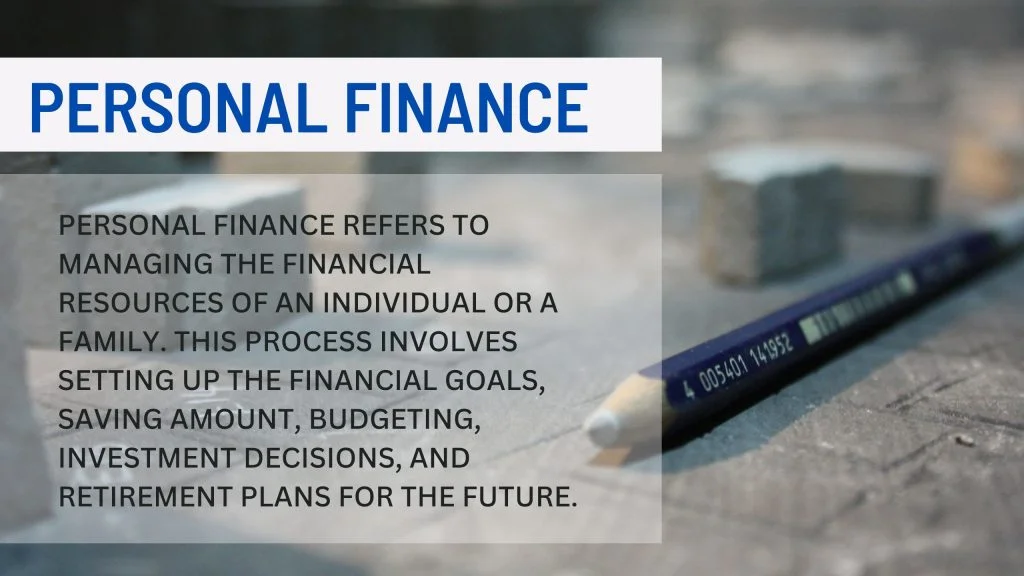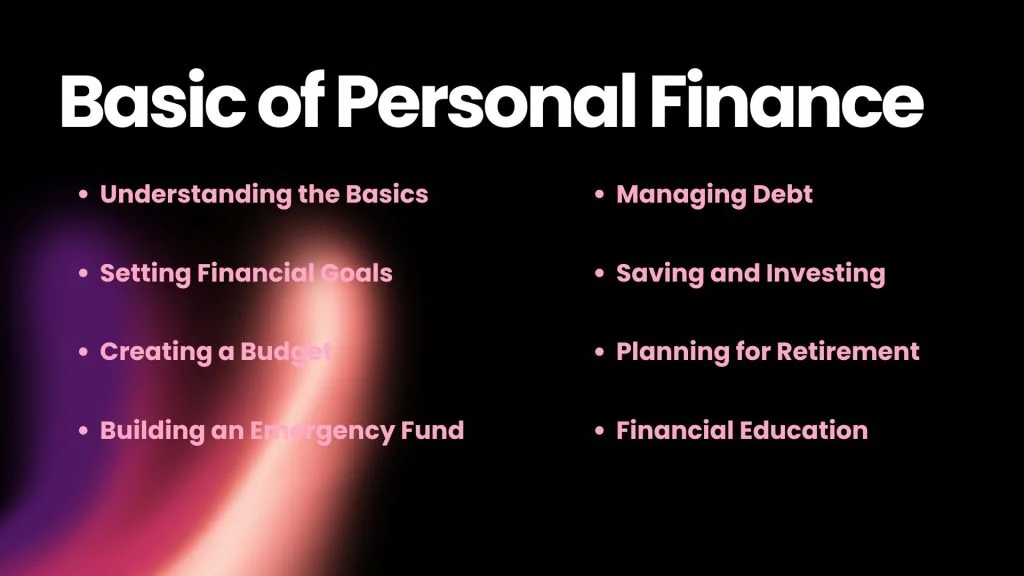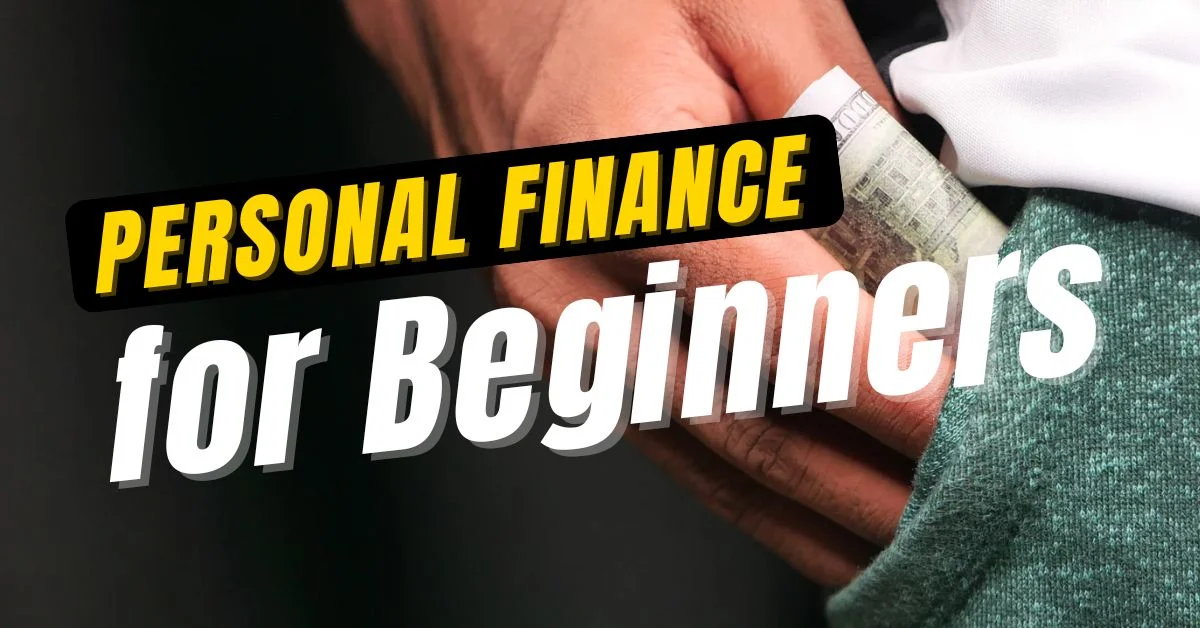As we start our careers as freshers in any field, navigating through personal finance can be a daunting but rewarding journey. And that’s what we are here for! We will help you explore through various aspects considered vital for personal finance for beginners. In this article, we will explore some basics to rectify your understanding of personal finance and go through various strategies to secure a healthy financial future.
1. What is Personal Finance?

Personal finance refers to managing the financial resources of an individual or a family. This process involves setting up the financial goals, saving amount, budgeting, investment decisions, and retirement plans for the future. Personal finance for beginners or an experienced individual covers various aspects like income, debt, expenses, taxes, real estate planning, and insurance. The primary goal of personal finance is to make sure we have a stable and healthy financial position for short term and long term needs.
ALSO READ : Top 6 Trends in Finance in 2024
2. Scope And Importance of Personal Finance for Beginners

Building a Solid Foundation
Personal finance helps us lay a groundwork for a steady and financially stable future. Just like a house needs a sturdy base, financial stability stands upon bases like savings, investments, budgeting, and careful spending. Understanding and strategising for personal finance helps us to take control of our financial position, build up to a future we desire, avoiding financial traps, and being financially secure in times of economic storms.
Pursuing Dreams and Goals
The main reason to master personal finance for beginners is to achieve all our dreams and goals. Every individual has dreams and goals that they want to achieve at a certain age, it can be to buy a house by 30, travel to various places, start a business or retire by 40. Personal finance serves as a roadmap to achieve these things. When strategizing for personal finance, there are things like setting a goal, making plans, creating budgets, that are to be constructed so that we can turn our dreams into reality.
Navigating Choppy Waters
One of the most crucial times when personal finance comes into play is in times of economic uncertainty. This includes times like national economic crisis, medical emergencies, loss in business or losing a job. Personal finance acts like an insurance in these situations, if a person has made healthy financial decisions beforehand such as buying medical insurance, saving up for emergencies, or investing in highly liquid assets, they can minimize the impact of damage in uncertain times.
Securing the Future
Personal finance for beginners if managed correctly can act as an insurance in future that protects us and our loved ones. Savings, investments, retirement, real estate planning, and several other personal finance strategies can ensure that we have a secured financial future. With the power of compounding interest, diversified investments, and professional guidance, we can create a financially healthy safe place for us with enough resources to survive economic distress.
Empowering Independence
Financial independence is not just about having money in abundance, its the freedom where we can live on our own terms. Personal finance for beginners helps individuals to make their own decisions without being influenced or dependent on others. By others, I mean family, credit cards, and loans, personal finance helps individuals to strategise their spendings, investments, and debts in such a way that they pursue their passion and ambitions without being held by financial constraints.
Cultivating Peace of Mind
In today’s fast paced world, peace of mind has just become one of the concepts people try to achieve. Mastering Personal finance for beginners and having stable finance have become one of the achievements that can calm us down in these chaotic times. A clear financial goal, a clear plan, and emergency plans can help us stay calm by knowing that we are on the right path to our goals, knowing that we are prepared for stormy times.
3. Basic of Personal Finance For Beginners

Understanding the Basics of Personal Finance for Beginners
Personal finance is a series of actions where we manage our financial resources in an effective manner to achieve our goals. It involves several different strategies such as planning, investing, saving, and budgeting. Personal finance helps us to ensure that we have a financially stable and secure future with a strong foundation.
Setting Financial Goals
One of the main things to understand for personal finance for beginners is that goals set the roadmap to your ultimate dream.
The first and foremost step in starting your journey towards financial freedom is to set a financial goal. The goal could be to buy a car, to build a house, to travel the world, or whatever your goals are. Having a clear idea about where you want to reach gives a clear idea about how much finance you need to reach that goal. Having a goal is like having a final destination, without a destination, you will just drive in circles till the fuel runs out.
Creating a Budget
Next part is the most crucial part of constructing your plans, to make a budget. A budget is a plan of action where every spending avenue is decided from the beginning based on the income, need, and basic expenses. It helps to create a structure and understand our income, expenses and areas of expenditures where we can cut back.
Start by tracking and making a list of all your incomes, after that, make a list of all your essential expenses like food, electricity, fuel, and whatever you consider as essential, next, make a list of all your luxury expenses like holidays, dining, gifts, etc. The goal is to ensure that you can cut back as much as you can from the expenses and save your income. The ideal goal should be around 20%-35% of your total income.
Building an Emergency Fund
One of the most important contingency plans is to make sure you have enough emergency funds in case of an economic crisis. When talking about personal finance for beginners, emergency funds are a crucial aspect to understand. To create a decent amount of emergency fund, which should ideally be able to cover over 6-8 months of your current expenses, you have to start saving or investing from the money you save from your income.
Emergency fund is different from the capital you are saying up for goals. Even though it is to be taken from savings you do to reach your goals, this is a different source of funds which ensures that you will have a stable time in times of crisis.
Managing Debt
Managing debt is one of the most consistent and necessary parts in personal finance for beginners. Debts are to be managed quickly and swiftly. When talking about personal finance for beginners, start by focusing on high interest debts such as credit cards and personal loans, because these high interest loans can compound in the same way your investment can. One of the best ways to handle these high interest loans is to make sure you consolidate your debt, or try to negotiate with the lender to lay off or reduce your interest to a payable amount. Once you have cleared these high interest loans, you will be free to focus on others debts.
Saving and Investing
Saving and investing are the core of personal finance for beginners and everyone. Start by saving for short term goals like emergency funds until you have enough to move onto other goals. For saving funds, simply saving them somewhere won’t be beneficial as the money would lose value over time. Saving accounts in banks offer a certain percentage of return which can help you save your money and get some return on it, helping your emergency fund stay afloat with the inflation rate.
Once you have completed and secure enough funds for your short term plans, move onto the long term plans. These can be to make a retirement account, insurance, or even investing in stocks and mutual funds for long term returns.
Planning for Retirement
One of the most crucial aspects for Personal finance for beginners is a plan for retirement. Retirement plans are something that should be started as soon as you can. You can take advantage of your employment plans if you have any to secure funds for your retirement plans. If your firm doesn’t provide retirement plans, you can open an Individual Retirement Account (IRA) which provides more benefits for your retirement plan than a traditional savings account. As for the capital to be invested in this plan should be 8%-15% of your current income.
Seeking Financial Education
Lastly, every individual should educate themselves continuously about the new and upcoming aspects of Personal finance for beginners. We live in a digital era where all information is available online for free. You can study various financial strategies, concepts and ideas through online podcasts, books, videos, and courses. By staying up to date with the latest ideas and concepts for personal finance, you can ensure that you aren’t left behind in time and take advantage of best strategies in the market that can lead you to your goal and more.
ALSO READ : 5 Steps in Investment Decision Process for Successful Gains
FAQs
What are the basics of personal finance?
Personal finance refers to managing the financial resources of an individual or a family. This process involves setting up the financial goals, saving amount, budgeting, investment decisions, and retirement plans for the future. The basics of Personal finance for beginners include :
1. Understanding the basic
2. Setting goals
3. Creating a budget
4. Emergency funds
5. Managing debt
6. Saving and investing
7. Retirement Plans
8. Financial education
What is the 50 30 20 rule?
The 50 30 20 is a personal finance technique which takes your after tax income into account to allocate the remaining amount into your expenses, spendings, saving and investment options. This technique states that 50% of your after tax income should be used towards the basic needs. The next 30% should be allocated towards the expenses that an individual desires. And the final 20% of the income should be saved or invested for future plans.
In short –
50% – Basics needs
30%- Wants
20% – Savings and Investments
What is an IRA – Individual Retirement Account?
An IRA – Individual Retirement Account is an tax advantaged investment account made for people who intend to save for their retirement. IRA offers several investment avenues like stocks, bonds, ETFs, and mutual funds, allowing investors to make a diversified portfolio based on their retirement plans.
4. Final Statement
Personal finance for beginners and experienced is a journey towards the ultimate financial goal. By understanding the basics concepts of personal finance, making a list of all your goals, creating a plan to save for those goals, and implementing healthy financial practices based on it, you can navigate your path to your financial goals and build a secure and wealthy future for you and your loved ones. I hope this article on Personal finance for beginners has been informative to you. And if so, start taking your first step now and get a move on towards your financial independence.


1 thought on “8 Important Steps for Personal Finance for Beginners”